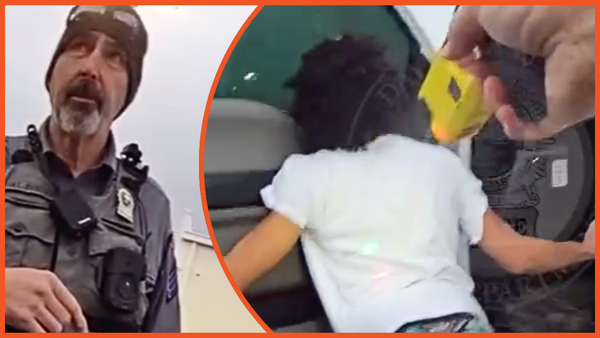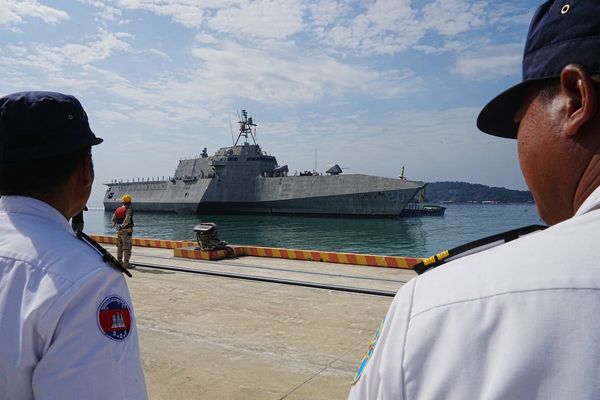
Victor Marillanca, who fled Chile as a political refugee and went on to serve Canberra's Spanish-speaking community for nearly five decades presenting on community radio, has died. He was 69.
Mr Marillanca died on Tuesday afternoon surrounded by his family, a statement shared by the Coneccion Latino Americana program on social media said.
"He has been a beacon of light throughout his life to many. We remain in constant awe of his achievements throughout his journey and his ability to connect with so many to selflessly better the life of his many communities," the statement said.
"While our loss is deep at home, we acknowledge his passing will be felt internationally. We remain content that he will continue to live through the memories in those in which he assisted and provided a voice for when they felt they could not be heard.
"He was an extremely loved man and I don't know how our lives will be without him."
Multicultural Affairs Minister Tara Cheyne also paid tribute to Mr Marillanca and expressed sympathy for his family, many friends and community.
"Mr Marillanca will be remembered for his unwavering support of Spanish-speaking people in Australia and his work strengthening the ACT's ties to Spanish-speaking countries," Ms Cheyne said.
2XX, the station which has broadcast Mr Marillanca's Coneccion Latino Americana program since its launch in 1976, celebrated its equal longest-serving volunteer and presenter, and current board president.

"We pass on our deepest condolences to Victor's family and friends and will be forever grateful for everything Victor has given over so many years to the Canberra community and our station," station manager Adrian Gibbs said in a statement.
Victor Marillanca was born on May 18, 1954 in Batuco, a poor rural town outside Santiago, the youngest of four children. His father was a former railway worker while his mother stayed at home with the family.
Aged 17, Mr Marillanca, who wanted to become a teacher, was awarded a government scholarship to study electro-mechanics at the State Technical University in Santiago.
Mr Marillanca, a member of the student socialist party, was kidnapped by the military during a rally at a university in Santiago, the Chilean capital, following the US-backed coup that removed Salvador Allende's elected socialist government in September 1973 and installed the oppressive dictatorship led by Augusto Pinochet.
The student party's work was focused on teaching people to read and write and assisting Mapuche people, like Mr Marillanca.
Taken to a weapons depot in the capital, Mr Marillanca was told he would be shot. He was put up against a wall with his hands tied and blindfolded. He later said he heard soldiers preparing their rifles and the commands to aim and be ready before the Batuco regiment commander ordered a halt.
On the day Mr Marillanca was kidnapped, many of his classmates were gunned down and killed. The survivors were sent to concentration camps, accused of being communists and tortured.
"They tied me up as if they were going to kill me, but they didn't," Mr Marillanca recalled in 2006.
Mr Marillanca was beaten, burned with cigarette ends and subjected to electric shocks. He was detained for 28 days and then kept under constant surveillance in Batuco for 15 months. He had to report twice a day and could not leave the town without approval; he was banned from meeting more than two people at once.
A friendship with Rory Allan, a New Zealand economist, who had worked for the Whitlam government in Canberra and visited Chile before the coup to see the "socialist experiment" in action, proved a lifeline for Mr Marillanca. Allan urged the Australian Embassy in Santiago to search for Mr Marillanca, who was found and granted exit documents after bribes were paid to officials.

On March 9, 1975, Mr Marillanca was granted approval to visit his mother in hospital, but instead boarded a flight to Easter Island. He arrived in Sydney on March 11 after flying via Papeete and Auckland, and headed straight for Canberra.
When Mr Marillanca arrived in Australia, he had one US dollar and a change of underwear.
Mr Marillanca first stayed with Rory Allan in Canberra and took a job after a fortnight as a brick-cutter in Fyshwick, relying on sign language to communicate with his workmates. He completed a 10-week English course and took a job washing dishes at Parliament House.
In Spring 1975, Mr Marillanca stood wearing a beret in the middle of Garema Place, shouting to a rally in Spanish his story of exile, torture and injustice, marking the second anniversary of the coup.
A passing university student, who was studying Spanish, stopped to translate. Mr Marillanca had a voice in Canberra for the first time.
In 1976, Mr Marillanca broadcast the first Spanish program on the newly established 2XX, the community radio station which took over from a student-run station at the Australian National University.
It was the first program to be aired in a language other than English on Australian community radio, which has since gone on to serve a vital role in connecting multicultural communities.
The program was officially launched in June 1976 by former immigration minister and then commissioner for community relations of Australia Al Grassby.
Mr Marillanca served as 2XX board president and multicultural representative, as well as stints as vice president, secretary and president of the National Ethnic Multicultural Broadcasters Council.
Mr Marillanca married Kayleen, a nurse, in 1978 and they had two children, Victor and Alyce. After time as a cleaner, storeman and house manager, he joined the Bureau of Statistics after passing the public service entry exam in 1982.
Mr Marillanca was also involved in establishing Transact in 1989, which became Companion House in 2000 and provides care for survivors of torture and trauma who seek refuge in Australia.
He served stints as president of the Australian-Chile Friendship Society, president of the Latin American Refugee Association, president of the Chilean Club of Canberra, an executive member of the Latin American Cultural Alliance, and was for a long time the capital's only Spanish-speaking justice of the peace.
Mr Marillanca told The Canberra Times in 2010 he busied himself in the Canberra community to keep his mind occupied.
"Getting involved and helping others ... helped me out in my personal experiences because I was tortured, I was a prisoner of war, as they called it at that time, and I was in a concentration camp and nearly killed," he said.
"If I [had not kept] my mind occupied, well, I would have been in the hospital, as there are cases of right now, because of the torture they went through."







